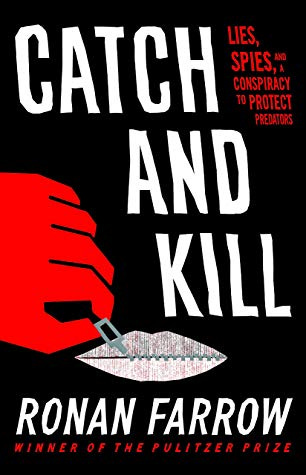What I’m Reading (No. 103): a novel in lists + important journalism
Back in November I read a great new novel by Matthew Dicks that I haven’t had a chance to tell you about yet. The structure is unlike anything I’ve read before.
I also recently finished Ronan Farrow’s important book about Harvey Weinstein — specifically, it’s the story of Ronan’s intense reporting on the monster of a man and NBC’s subsequent killing of the story.
Let’s get right to it.
Twenty-One Truths About Love by Matthew Dicks (2019, 341 pages)

Daniel Mayrock owns a bookshop; he bought it after quitting his job as a teacher. It’s far less romantic in reality than in his daydreams. Jill Mayrock wants a baby, but Daniel is terrified at the thought, secretly in debt, and trying to get out from under the shadow of Jill’s deceased first husband.
So what makes this delightful book unique? It’s written entirely in the form of Daniel’s eccentric, neurotic, and heartfelt lists.
There are lists brainstorming how to avoid the financial disaster, the myths vs. realities of owning a bookstore, comparisons to his wife’s dead husband, his insecurities about becoming a father, and, of course, 21 Truths About Love.
It’s as unique a format as you’ll ever come across, and while part of me wanted a standard narrative structure, my brain also filled in those parts on its own; this is the beauty of Matthew’s writing . . . through the lists, you do in fact get a dramatic and witty and poignant narrative even if it doesn’t seem like it as you’re reading.
Truly, some of the lists are so thoughtful that they could be framed as prints. Combined with the author’s natural humor, it’s a story that boldly defies convention — always a risky move — and entirely works.
Twenty-One Truths About Love is a very quick and utterly potent read that I think just about anyone would enjoy.
A List of Lists!
Books that are lists are great. Especially for the book nerd. Here’s a handful I’ve enjoyed:
The Tools of My Trade by David Mike Hamilton. This book is a catalog of the books from Jack London’s personal library, including notes he took down in those books. It was especially handy for this article and a surprisingly fun perusal.
1,000 Books to Read Before You Die by James Mustich. A heavenly book that I’ve mentioned many times before. Jim givers equal share to not only “classic” and highbrow literature but also non-fiction, bestsellers, and underlooked titles.
The Lifetime Reading Plan by Clifton Fadiman. I picked this up a while back at a Goodwill, I think. Fadiman put together a pretty traditional list of over 100 books to read in a lifetime. It’s a fine book, but Mustich’s is far better.
The Well-Educated Mind by Susan Wise Bauer. This a great introduction to why everyone should be aware of the classics of literature across all genres — not just fiction. From philosophy to history to science, Bauer gives excellent explanations about the importance of the books she lists and tips for reading them (she admits they aren’t always easy). An excellent book.
Checklist Manifesto by Atul Gawande. A how-to manual and surprisingly motivating argument about the vital importance and power of the simple checklist — not the to-do list. They are very different.
Catch and Kill: Lies, Spies, and a Conspiracy to Protect Predators by Ronan Farrow (2019, 419 pages)

As just about everyone has said about Farrow in the last year or so, he may have a famous last name, but his Pulitzer Prize-winning journalism and writing stands entirely on its own.
About 5 years ago, as a reporter for NBC, Farrow started digging into leads regarding Harvey Weinstein’s predatory nature. It’s a story that a number of other renowned journalists had tried to uncover but ultimately been scared off by Weinstein’s thugs (a scary combo of powerful lawyers and actual spies).
Farrow doggedly stuck to the story, though, and ended up with a damn fine piece of journalism. So he brought it to his superiors at NBC . . . and was promptly shot down and told to stop his reporting. For seemingly no reason at all.
Which just led Farrow to dig deeper. Turns out Weinstein had his claws all over not only the legal system, but mass media as well. He’d been killing stories for years, and he did it again with NBC.
Unfortunately for the National Broadcasting Company, Farrow then brought the story to The New Yorker. Admirably — more than they were even given credit for, really — they went ahead and published Farrow’s rock-solid and unimpeachable journalism.
Catch and Kill is both an expansion of that reporting (including the downfall of Matt Lauer) and the story of the reporting itself. Makes it hard to trust mass media generally, and NBC especially. Not nearly enough heads rolled for the mistreatment of the Weinstein story.
It’s an excellent and important book that’s written like a thriller. Farrow is an incredible journalistic talent.
That’s all for me this week. I sure appreciate the time and inbox space. Here’s to a great year of reading!
-Jeremy


